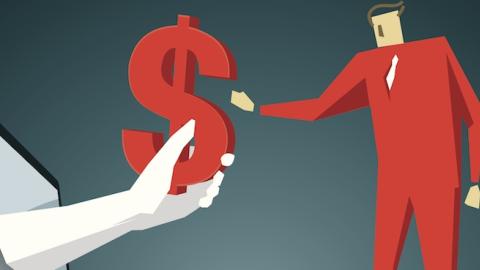How should the U.S. deal with the growing number of regimes that are not only corrupt, but using corruption as their guiding principle of government? It is an increasingly urgent question. From rogue states to terrorism, insurgencies, cyberattacks, and disinformation, it is kleptocracy, or “rule by thieves,” which fuels the salient geopolitical threats of our time. Failure to recognize the true nature of these regimes, let alone our own complicity in their crimes, poses perhaps the single greatest challenge to U.S. national security today.
Since the end of the Cold War, kleptocrats have twisted the processes of globalization to build a vast and intricate worldwide system of corruption. Nevertheless, individual cases tend to follow a consistently simple pattern: A fortune is stolen from the public funds of a vulnerable country, laundered through labyrinthine offshore corporate networks, and finally secured in high-value assets in the West.
At every stage of this process, the primary mechanisms for transferring stolen cash are “anonymous” companies, trusts, and other financial instruments whose true ownership is obscured. They may appear to be owned by a string of other (equally opaque) companies, or are perhaps fronted by middlemen while real control is exercised elsewhere. Whatever the structure, the intention is the same: to conceal the true owner’s identity so they can move ill-gotten gains around the world, without any questions being asked by law enforcement agencies.
The Panama Papers gave the public an unprecedented glimpse behind this corporate veil into a vast shadow economy concealed safely offshore. Still, why should the average American, whose life is so far removed from the glamorous lifestyles enjoyed by successful kleptocrats, care about anonymous companies?
Kleptocracy may not affect Americans in the same way that it does Russians, Chinese, or Iranians, but make no mistake: they are also footing the bill for kleptocrats’ bad behavior, and the cost is going up all the time.
If you doubt that the sheer volume of illicit cash flowing into the U.S. can distort our markets, just ask anyone on a normal salary who has tried to buy real estate in Manhattan or Miami. And kleptocrats don’t just bring their dirty money, but also the criminal values and practices they used to acquire it. The lucrative financial inducements with which they tempt lawyers and bankers into complicity have incentivized unethical conduct at our most prestigious financial and legal institutions.
Meanwhile, U.S. taxpayers continue to pay for myriad global issues which can be blamed squarely on kleptocratic regimes. This is straightforward mathematics, when you realize that the amount of money stolen from developing countries dwarfs their collective development and other expenditure needs. In Ukraine, $12 billion apparently goes missing from the public finances annually, yet American taxpayers have sent its systemically corrupt government billions in assistance and loan guarantees. Or try Iraq: where are all those billions of U.S. dollars sent to rebuild its infrastructure, educate its population, and strengthen its military?
The truth is that stolen public funds (and the foreign aid payments sent to replace them) often end up sitting in offshore accounts, or invested in luxury Western assets. There is one way for unscrupulous lawyers and bankers to make this happen: moving the money through anonymous companies.
Unfortunately, this brings us to an irrational contradiction which continues to hamstring America’s fight against global corruption. While the Justice Department ambitiously pursues graft suspects worldwide, and Treasury expands its anti-money laundering rules, the anonymous companies that enable large-scale corruption are not only left untouched, but actively encouraged to operate right here in America.
Thanks to the persistence of a few greedy states, the U.S. has become one of the leading jurisdictions worldwide for hiding and legitimizing stolen wealth. Delaware is all but synonymous with corporate anonymity and corruption, having for years campaigned against legislative attempts at greater transparency. For just $240, you can even establish an anonymous company for your pet cat there. But anonymity is also big business for South Dakota and Nevada, while Alaska, New Hampshire, Wyoming, Tennessee, and Ohio likewise compete to attract kleptocrats and criminals.
If Americans should be angry that their hard-earned tax dollars are being sent overseas to be stolen by people infinitely richer than they are, they should be outraged that it is possible for this money to be transferred secretly back to America and spent in ways which undermine their values.
This hypocrisy does not go unnoticed in countries which have already been gutted by kleptocracy. Is it any wonder people are rejecting American leadership and democracy when they know that, at the same time as they are being lectured on their own anti-corruption failures by John Kerry, their crooked leaders are free to drive supercars around Miami or party in Manhattan penthouses?
Thankfully, America may finally be waking up to the ruinous costs of anonymous companies. Encouraged by the outrage that followed the Panama Papers, an unusually broad consensus is emerging which already includes some unlikely bedfellows. Those calling on Congress to end criminal secrecy so far this year include senior government officials, law enforcement officers, at least 37 NGOs, and, perhaps most surprisingly, an array of commercial interests that includes all major U.S. banks (who are doubtless tired of being fined huge sums for failing to spot the criminals who routinely abuse their services).
What they are asking for is straightforward, and it is just possible that ending criminal secrecy might become that rarest of political beasts: a truly non-partisan issue. Whether your priority is fixing world hunger, promoting democracy, or thwarting the U.S.’ most dangerous enemies, the answer is the same: We need to stop kleptocrats from looting and destabilizing their own countries, and the first step towards this is denying safe haven to their dirty cash.



















